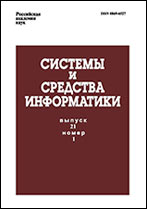|
This article is cited in 2 scientific papers (total in 2 papers)
Probabilistic approach to solving the magnetoencephalography inverse problem
M. B. Goncharenkoa, T. V. Zakharovaab
a Department of Mathematical Statistics, Faculty of Computational Mathematics and Cybernetics, M. V. Lomonosov Moscow State University, 1-52 Leninskiye Gory, GSP-1, Moscow 119991, Russian Federation
b Institute of Informatics Problems, Federal Research Center "Computer Science and
Control" of the Russian Academy of Sciences, 44-2 Vavilov Str., Moscow 119333,
Russian Federation
Abstract:
The brain study is the one of the most popular research area in
contemporary neuroscience. It accumulates efforts of broad research groups
involving different kinds of experts: psychologists, mathematicians, etc. The
main problem in this area is how to localize cerebral cortex activity
using experimental data. This problem is critical for all neuroimaging
methods (functional magnetic resonance imaging, electroencephalography,
magnetoencephalography (MEG), etc.). In the paper, MEG data are considered.
Magnetoencephalography is a noninvasive neuroimaging technique
which allows recording extra weak magnetic fields generated by neurons in
human brain. Sources reconstruction using MEG data is an ill-posed
inverse problem. The paper considers the Bayesian derivation of the inverse
problem solution for MEG data. The main steps are described and necessary
calculations are provided. Particular attention was paid to such advantage
of the Bayesian approach as universality. It was shown how other popular
methods which are widely used in research could be obtained within the
unified framework. A generalization to the group-wise experiment is also
considered. The paper also provides possible ways of further improvement of the MEG
inverse problem solving techniques using the Bayesian approach.
Keywords:
Bayesian approach; magnetoencephalography; inverse problem; ill-posed problem;
a posteriori maximum estimation; optimization methods.
Received: 04.10.2017
Citation:
M. B. Goncharenko, T. V. Zakharova, “Probabilistic approach to solving the magnetoencephalography inverse problem”, Sistemy i Sredstva Inform., 28:1 (2018), 35–52
Linking options:
https://www.mathnet.ru/eng/ssi557 https://www.mathnet.ru/eng/ssi/v28/i1/p35
|

| Statistics & downloads: |
| Abstract page: | 258 | | Full-text PDF : | 90 | | References: | 31 |
|




 Contact us:
Contact us: Terms of Use
Terms of Use
 Registration to the website
Registration to the website Logotypes
Logotypes








 Citation in format
Citation in format 
